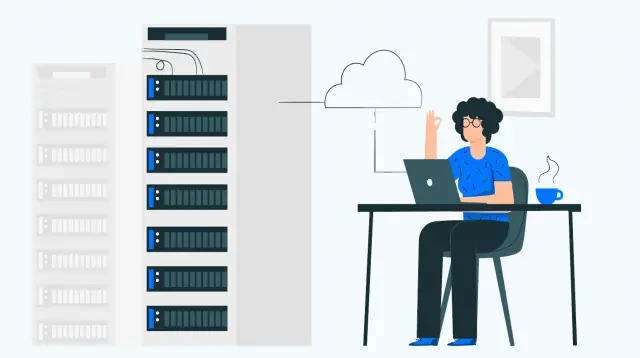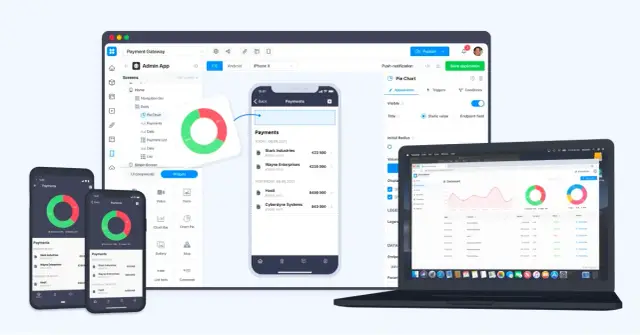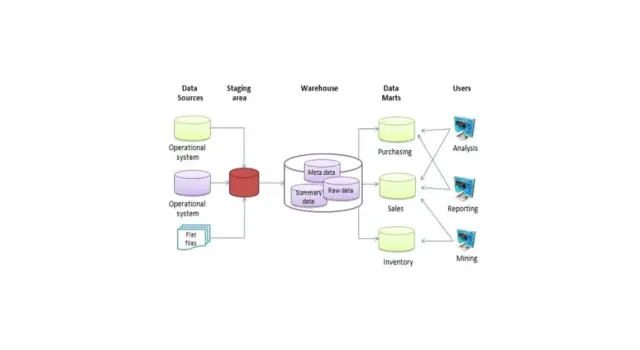Choose the Right Database for Your No Code Mobile App: Points to Consider
In this article, we'll guide you through the selection process for your backend database service, analyzing every detail to make the best decision.

How to Choose the Right Mobile App Database for Your App
As you may already know, choosing your backend database service is a crucial step in your mobile app development process. Sometimes, the choice can seem overwhelming because there are many options.
What is a no-code app?
First of all, let's clarify what a no-code app is. No-code is a development process that doesn't require the developer to write every single line of code. In fact, developers can build entire and functioning mobile apps without writing any code! It doesn't mean that the code isn't there; it only means that it is automatically created, and if the no-code app building tool you're using allows it, you can even export it!
This is possible thanks to no-code building platforms: software tools specifically designed for the aim we've just described, allowing developers to create mobile apps or web applications without having to write the code. One of the most well-known and recommended examples of this type of tool is AppMaster: it's a no-code app building platform with which you can create mobile or web applications.
AppMaster made the app developing process a lot easier: potentially, even a beginner with no coding experience can start working with it and create their own app; however, AppMaster is also extremely useful for expert developers: it makes the developing process a lot quicker, easier, and less time-consuming. When you need access to the backend code, you can simply access it, export it, modify it, use it on another platform, and so on.

Why do you need a backend database service for your no-code app?
No matter the reason why you are building a mobile app (for personal use, for your clients, for your business management) when you develop an application, you need access to data. You can store your data in various places, but what matters is that you need a backend database service and access to it.
What is a backend database?
As you may know, software systems are made of two sides: frontend and backend. The front is what the users see; the backend is where all data is stored, accessed, and retrieved. Backend is, in other simpler words, anything that happens behind the scenes. The backend database is where all of your data is stored. Data from the database can then be retrieved (other than be updated or deleted) to allow the website, application, or platform to function. Besides databases, the backend is also made from servers and API (Advanced Programming Interface).
The importance of data
The reason why you need a backend database is that any software platform (whether it is a website or a no-code application) is powered by data. The quality and performance of an app depend on its ability to collect and access data quickly and efficiently.
Importance of selecting the exemplary backend database service
Now that you know what a backend database is and how important it is to ensure the correct functioning of any software, you can better understand how important it is to select the right backend database service. First of all, let's understand what we mean by backend database service.
Backend database services are offerings that allow you to store and manage data through external applications. Most developers use these types of database services because this solution is much more convenient than the alternative: building and installing. You are configuring and maintaining a private server.
Let's take some time to consider the advantages of an external backend database service:
- with backend database service systems, data becomes accessible from anywhere
- you have both online and offline data access
- mobile database service is easier to maintain, usually requiring minimum effort from the developer (the backend database service provider does the hard job)
- because the database system is synchronized, it helps multiple users access the data at the time
- with backend database services, it is also easier to synchronize data across multiple devices (laptops, smartphones, tablets, and more)
As always, when you rely on an external service, you want to ensure they offer exactly what you need and are reliable. This section will help you understand how to search through backend database services and find the most suitable for you.
Types of mobile app databases
Let's take a look at the alternatives at your disposal when it comes to backend database services.
Data warehouses
The data warehouse systems are designed to support analytics activities: they are huge virtual places where tons of historical data are stored. Data is derived from different resources: mobile apps, log files, forms, and more.
The primary purpose of warehouse databases is to collect tons of data and then perform queries and analyze those data. Businesses usually use them to derive insights from the data they collect and, based on those insights, make decisions, design strategies, make investments, and so on.

When should you pick a data warehouse?
It makes sense when the primary purpose of your no-code mobile app is to collect data that you can analyze at a later time.
Distributed warehouse
As the name suggests, distributed data warehouses are geographically located in distant locations with no physical shared resources. This is the ideal solution if your users are spread across different countries.
As you may know, the physical distance between the user and the server where data is located is important when it comes to performance. A few dozens of kilometers won't make any difference. Still, when your users are in East Europe and your servers in North America, it can become a problem (even because your competitor with servers located in Europe is able to provide a more efficient service and a quicker and more performant mobile app).
When should you opt for a distributed data warehouse?
You should opt for a distributed data warehouse if your mobile app users are spread in different countries. This way, you can ensure every user can have the same top-quality mobile app usage experience, no matter where they are geographically located.
Operational database
An operational database would allow your mobile app users to edit or remove data in real-time. When a mobile app is highly interactive, it needs to have a backend database that can constantly retrieve data and edit or delete it according to the user's necessities. The other database options we've seen so far wouldn't be suitable for a highly interactive mobile app because data retrieving would be too slow and, consequently, the mobile app users would be slow and inefficient.
When should you opt for an operational backend database service?
If you are developing a mobile app that can be considered a platform where users can manage options, data, information, and more, then you should opt for an operational database. A mobile app that allows some interaction and customization should have an operational backend database service system.
Relational database
There is another option that is suitable for complex mobile app projects, and it is a relational database. They organize data into tables that are related to each other through shared data points. This feature enables users to retrieve more than one data table with a single query.
When should you opt for a relational database?
One of the main advantages of relational databases is that they eliminate redundancy. If your mobile app project is particularly complex and needs to manage great quantities of data, you may want to opt for a relational database.
What is a spreadsheet, and do you need one?
Especially for beginners, databases and spreadsheets can look like the same or interchangeable. They both serve the same purposes: databases and spreadsheets both allow you to store, create, read, update or delete data, but if we look a bit deeper, they can show important differences. You should be aware of such differences to choose whether you need a backend database service or spreadsheet for your no-code mobile app development project.
What is a spreadsheet?
Spreadsheets are easier to understand and implement than databases, even though they may have some limitations. As the name suggests, spreadsheets are basic tools that utilize a row and column format. The most simple examples are Google Sheets or Excel: spreadsheets created with these platforms allow data entry and manipulation of data in a very simple way, but do they limit the performance of your mobile app? Let's examine the advantages and disadvantages of using a spreadsheet.
Advantages of using spreadsheets
The main benefit of using spreadsheets instead of a database is that they are very simple and integrate with your mobile app. After all, using a spreadsheet is just as easy as filling out a form.
Spreadsheets are also no code data managing systems, and they are one of the best options for students and beginners.
Disadvantages of using spreadsheets
Of course, spreadsheets have many limitations. As soon as you start managing a lot of data, spreadsheets will no longer be suitable. Spreadsheets can only hold a limited amount of data, or the data retrieving, and editing process will become just too long and inefficient. Experts, however, can still use spreadsheets to capture their basic ideas or build simple prototypes before moving on to the real mobile app development process.
The main limitation when it comes to spreadsheets is that they can't process complex functions. If the mobile app you're developing is extremely simple, you can still use spreadsheets, but if your mobile app is meant for anyone other than you, then you'll need a database system.
How to select the most suitable for your needs
Data structure
Data structure depends on the mobile app requirements. Different mobile apps require different types of data structure, and, of course, the data structure you've designed dictates your choice of the database system and the backend database service.
Data size
Data size depends on storage requirements. If the no-code mobile app you are developing is very simple, maybe you only need it for personal usage, then you may even do without a database and opt for a simpler spreadsheet. But when you have large quantities of data, you need to select a backend database service that has the capacity to store it and the performance abilities to retrieve and edit it quickly and efficiently.
Data security
Data security is an important theme. One of the main advantages of relying on an external backend database service is that you don't have to take care of security in the first person. The service provider is usually responsible for data security, and security is part of their offer.
It's also important to highlight how important data security is for your user: when they use your mobile app, they entrust you with their data; sometimes, they are personal and sensible data like credit card numbers or health information. It would help if you guaranteed your users that the data they provide would be safe and not accessible to any attacker. You can only do this by hiring a reliable backend database service. If you need to spend a little more but get a more secure server, the higher price is always worth it when it comes to security.
Data model flexibility
When you pick your backend database service, make sure they allow some flexibility. No one standard model will be precisely what you need for your no-code mobile app project, so you want to make sure you have room for some adjustments.
Needed support
In a backend database service, the price can or can not be included in customer support service. Support is always important when you purchase these types of services (database services, web hosting, or others). But the amount of support you need depends on your expertise. If you are a beginner, you may need someone who guides you through every step of your database configuration: in this case, make sure to get a database provider that offers this service. If you only need support in extreme cases because you are able to manage standard tasks on your own, then you may save some money on the support.
Mobile app scalability
Suppose you're starting small but already planning to scale up your no-code mobile app. In that case, you should pick a backend database service that allows such scalability so that, when the moment comes, you don't need to change your provider but can scale up the one you are already using.
Number of devices
Suppose you are developing a no-code mobile app that users can use on different devices. In that case, you want to ensure that the database you choose has a feature included to resolve conflicts that may be created between devices.
These days, most mobile apps can be synchronized on multiple devices (many users use the same apps on both their smartphone and their tablets). For this reason, this becomes an important feature to consider.
Examples of no mobile code databases
Realm DB
Realm DB is an open-source relational database that, as we've mentioned, is suitable even for complex no, code mobile app projects.
MongoDB
This is another open-source database designed for mobile app projects. It's a NoSQL database program that is highly scalable and based on the relational model. We've seen that relational databases are very scalable and suitable for complex projects. Even if you are starting small but intend to scale up your app, our recommendation is to start with a relational database, even if it may take some extra time to configure compared to a simple spreadsheet. This allows you to have your job facilitated in the future.
Conclusion
In this article, you have learned what a database is and why it is important for your no-code mobile app project. Selecting the most suitable database is the first important decision you need to make when you start developing a mobile app. With this article, we hope we've just simplified your decision-making process.





